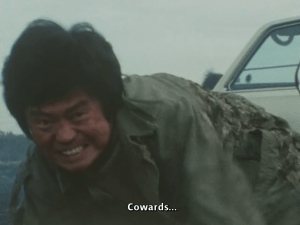Reviews
Kaiketsu Zubat: Episode Four Review
The Tokusatsu Network staff continues its review of Kaiketsu Zubat with Episode Four. Having established our character to some extent, one may think it is time for the plot to develop further.
It doesn’t.
Wait. Don’t take it the wrong way. As my colleagues have pointed, this is a show of its time in all of its aspects, another successful execution of the good old formula. As such, the execution itself is what made this episode so enjoyable.
This time, I’ll provide a summary of the episode pointing out the “crap-tastic” aspects of it, not as arguments against its quality, but as examples of the tropes that make the genre so endearing and such a fun thing to watch.
This week’s villain is Onikan, an old-fashioned, half-masked, Dakkar-insignia-kimono-wearing gangster who runs an illegal gambling operation in some godforsaken village in northern Japan. The only farmer who has not fallen in Onikan’s trap is young Makoto, who on his way home found a feverish Midori, who is then taken and transformed into a human piñata to force Makoto into gambling. Then Hayakawa, with impeccable timing, as usual, appears to save the day, not before humiliating and not without shameless property damage. Hayakawa then faces off with this week’s henchman: the gum-chewing Waltz Lee, a deadly martial artist.
Somehow parting ways with the villains, and while Midori (whose fever is never mentioned again) recovers, Makoto explains that most of the farmers in the village have already lost their lands to Onikan. Hayakawa leaves asking Makoto not to tell anyone he was there. Meanwhile, Onikan has gathered another group of farmers for a gaming session. Before it can begin, an appropriately kimono-clad Hayakawa appears. After smashing one of the guards onto the gambling area, he’s, surprisingly, invited to play.
Revealing the game to be fixed, the hero is overpowered and, just as easily as he infiltrated, he is taken prisoner with the other farmers, who now have to surrender their lands for their freedom. Not that it could have been done like this in the first place, of course.
Meanwhile, Makoto and Midori unconcernedly take a ride on his tractor when an Onikan henchman comes. The henchman informs Makoto that because of his resilience to give up his land, all the other villagers were imprisoned, including Hayakawa. As if it would make any difference, Midori, somehow knowing where to go, runs in search of Hayakawa. Meanwhile, Makoto is left behind while all this happening, just as Onikan planned.
Osamu, now a stick-and-bundle vagabond, conveniently finds the unconscious Makoto. Cut to them running to find Midori beaten to a pulp yet again with her arm broken. As in any respectable godforsaken village, there is no doctor and the nearest hospital is an hour drive away.
Guess who the only car belongs to?
Onikan, of course!
He demands Makoto’s land deeds in return of lending him the car. However, Hayakawa, the god of good timing, intervenes just in time. After dispatching some goons, Hayakawa takes Makoto with him and leaves Onikan in a rage seizure.
On the way to the hospital, they are intercepted by the previously, and conveniently, absent Waltz Lee. Hayakawa confronts him so Makoto can drive Midori to a hospital.
The ensuing and brief fight portrays the unceremonious way in which many henchmen are treated in the genre– Hayakawa gets the upper hand on Waltz Lee by throwing his bloody hat at him.
Back in the car, Makoto decides to use a shortcut and drive across his field, only to be ambushed by the clairvoyant thugs of Onikan, who obviously knew he would take a detour.
Makoto, Midori, and Osamu are thrown out of the car by a barrage of bazooka explosions. Makoto, in a fit of youthful and righteous anger, yells, “If you’re going to shoot, shoot me!”. Makoto, apparently, is unaware that his death would surely mean Midori’s demise.
Hayakawa arrives before a dying Makoto, who then asks him to make Midori happy.
In the end, Hayakawa defeats the goons, kicks Onikan’s ass, and leaves just as he arrived; with Midori and Osamu calling out to him yet again.
We later find that Dakkar wanted the farm lands because there was oil in them.
Oil.
In Japan.
A volcanic archipelago.
I beg you again not to misunderstand me. All this– the unresolved plot details, the impossible coincidences, the ungodly bad guy to good guy death ratio– these are all staples that built the genre and a way to see what was considered cool and exciting back then.
If you are able to not only see beyond this craziness but take it in as part of a whole, you’ll be able to appreciate, for example, the nice homage to samurai cinema done in the Onikan lair sequence or the great performance of Naoyuki Sugano as Makoto.
These shows are obviously made with a lot of love, which I invite you watch and feel. You may end up loving it just as we do.
Every Wednesday The Tokusatsu Network staff members review every episode of a tokusatsu series. To see previous episode reviews, visit our Reviews page.























